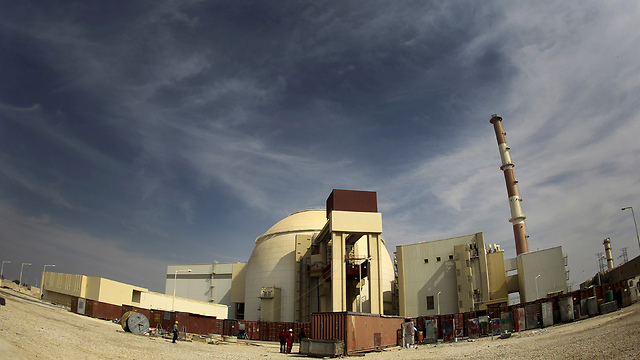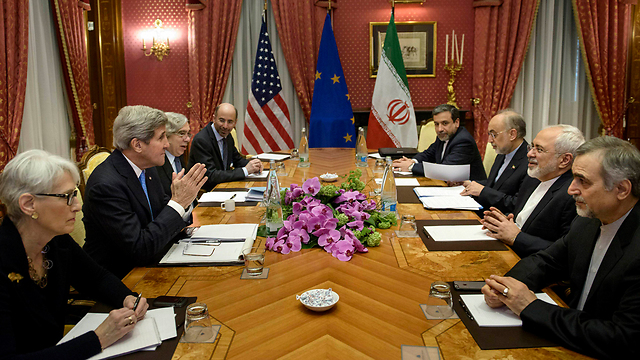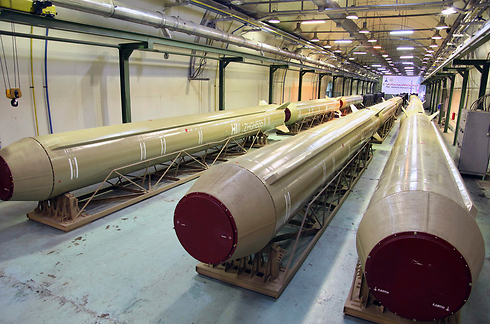Analysis: Five days before the deadline for implementing the deal with the West: Intelligence officials let on that Iran is not meeting its obligations to dismantle its nuclear program.
Following the signing of the nuclear deal in July, the sanctions against Iran will be lifted within the next seven days, on December 15. But Iran is not meeting its obligations to dismantle its nuclear capability as per its agreement with six world powers.
This revelation was confirmed by Western intelligence officials who have been following Iran’s dismantling of its nuclear program.

Nonetheless, in Israel there is no mistaken illusion: the sanctions on Iran will indeed be lifted next week, at the appointed time, and moreover while world powers try to blur the fact that this process will take place despite Tehran’s failure to honor its commitments.
According to the agreement, the Iranians have until December 15 to dismantle two-thirds of its active centrifuges, so that they will not have more than 6,000 old-generation centrifuges in their possession. All the advanced centrifuges will be taken apart, the stockpiles of enriched uranium (up to the grade of 3.6 percent) will be reduced from 7,000kg to 300kg and the medium-grade enriched uranium will be destroyed.
The Iranians are also obligated to make engineering changes to their plutonium creation at its Arak reactor, so that it will not be able to create military-grade material. They must also allow the continuous presence of International Atomic Energy Agency (IAEA) inspectors at their nuclear facilities.
Deliberate deception
None of these clauses have been fulfilled. Yedioth Ahronoth has received information from Western intelligence officials showing with that the pace the Iranians are working at, they will only meet their obligations sometimes during the second half of 2016 – and perhaps even later.
However, this seems not to make any difference to the IAEA. Reuters news agency revealed the draft resolution of the IAEA board of governors, which sets out that “all the activities in the road-map for the clarification of past and present outstanding issues regarding Iran’s nuclear program were implemented in accordance with the agreed schedule and further notes that this closes the Board’s consideration of this item.”
In contrast to the board of directors, however, IAEA inspectors – those who are actually supposed to be confirming whether Iran is meeting its obligations – revealed this week that Iran is in fact not keeping to its commitment to give a full report of the military components that its nuclear project had in the past. This report was another requirement of the nuclear agreement.
The inspectors said that there is reason to assume that the Iranians had been engaged in nuclear-military development until 2009 – contradicting a 2007 American intelligence report which stated that Iran had discontinued its nuclear weapons program in 2003.
The conclusion that is missing from this assessment is clear: American intelligence reports on the subject of Iran are deceptive and fixed, probably for political motives.
The Iranians for their part have signaled that they do not accept the ruling of the IAEA inspectors. They have requested that only the board of directors – which is comprised of representatives of the world powers at the international agency – will be the ones to assess whether Iran is adhering to the clause that requires it to reveal its nuclear weapons project.
The Iranians hope that the representatives of the powers, who are diplomats, will gloss over this finding from the inspectors on the ground. Going by the draft resolution revealed by Reuters, it seems that the Iranians will not be disappointed.
Another issue has arisen ahead of the IAEA’s publication of its report on whether Iran is meeting its obligations. According to the world powers party to the agreement, Iran has breached another requirement it was supposed to meet in order for the sanctions to be lifted entirely. Part of the Vienna agreement involved the non-proliferation of unconventional weapons – including a ban on ballistic missile tests.

However, it was recently revealed in the West that Iran carried out such a test – involving a long-range ballistic missile – on its border with Pakistan, around a month ago. The US government expressed its concern at this breach of the agreement, but the State Department simply said that they needed to “check the nature of the test” with satellite imagery.
A gift to Rouhani
This is of course a pretense of innocence: it’s not only that the US government and intelligence apparatus know exactly what this test was, they also know that two ballistic missiles were fired within a relatively short space of time.
An American official confirmed to The Associated Press that Iran carried out the second test with a ballistic missile – to which a nuclear warhead can be affixed – on November 21. The official further stated that Iran only reported the first tests, which it conducted on October 10. The two tests are a severe violation of the nuclear agreement.
“If we verify these reports and discover that there has been a violation, we will take the appropriate measures,” said State Department Spokesperson John Kirby.
The Russian alibi
Behind the tough statements it is clear that the US, along with the rest of the world powers, fully understand the firing of these missiles – but is making a supreme effort to cover it up in order not to embarrass itself.

Every intelligence official in the West also knows which preliminary stage Iran is at with regard to dismantling its nuclear capabilities, as well as being aware of Iran’s violations concerning its ballistic missiles and the distribution of weapons to terror organizations in the Middle East – i.e. Hamas, Hezbollah, Islamic Jihad and the Houthi rebels in Yemen.
The Russians are on the threshold of an enormous business deal with Iran, worth billions of dollars, that is supposed to extricate Moscow from the economic crisis it has fallen into as a result of the West’s sanctions and the oil price crash. A senior Russian inspector at the IAEA stated this week that Iran “is meeting its obligations regarding uranium enrichment,” probably in order to create a Russian alibi for the advancement of its deal with Iran.
The Obama government also has a clear interest in covering up the fact that Iran is still not sticking to its commitments, a state of affairs which would obligate the US to admit that it had misled Congress. Also in play here is the US’s desire to strengthen the so-called “pragmatic government” of Rouhani against the more conservative elements in Iran, ahead of parliamentary elections that are due to take place in a couple of months. The lifting of sanctions would strengthen Rouhani’s standing.
During the first stage of the lifting of sanctions – which starts on December 15 – $150 million in frozen funds will be released to the Iranian regime from European banks. Straight after that a series of commercial agreements will gradually be able to be signed between Iran and different countries around the world, and the rest of the funds released.
As reported by Ynetnews
